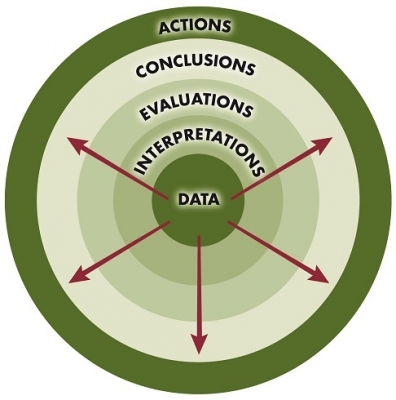
“The only wisdom we can hope to acquire is the wisdom of humility: humility is endless.” — T.S. Eliot, Four Quartets, 1935
I once asked the CEO of a New York bank to describe his communication style.
 “When I started out as a manager,” he said, “my style was to coach. That was the prevailing philosophy. So I’d tell my staff how to organize their client lists; I’d tell them how to sell our products; I coached them in handling complaints; heck, I’d tell them what to do with their personal lives.”
“When I started out as a manager,” he said, “my style was to coach. That was the prevailing philosophy. So I’d tell my staff how to organize their client lists; I’d tell them how to sell our products; I coached them in handling complaints; heck, I’d tell them what to do with their personal lives.”
“Then one day my boss invited me into his office. He said: “You know, you’re a very bright guy, but your staff doesn’t seem to be responding to your style of management. They seem demoralized.”
“I was shocked. ‘I’m trying to be a coach,’ I said. ‘I’m trying to teach people how to do their jobs.’
“Yeah, I know,” he said. “But how long do coaches last? One wrong answer, and you’re wrong forever. Imagine instead if you taught them to learn from each other, not just from you. Stop trying to impress them so much. The best you can do is ask good questions. That sets the tone for everyone else.”
After absorbing his boss’s advice, the CEO seized every opportunity to ask questions. If someone asked him what to do, he’d say: “What would you do? What do you need to know to make this decision?” Over time, people noticed the change. They saw that he was more open to other points of view. The quality of communication improved. Decision-making grew more decentralized. And the bank’s performance improved.
This story illustrates how people – in an attempt to be good managers – can become poor communicators. It illustrates our habit of elevating opinions to the level of expertise, our tendency to make snap judgments, our instinctive desire to be on top of things. It shows how these habits are ingrained and reinforced by our culture – our desire to be in control, our trust in “expertise,” our desire to be perceived as competent. Through our failure to question what we think we know, through our failure to get into the habit of asking good questions, we perpetuate a culture of poor communicators.
There are three tools that will help you re-learn how you communicate. They are: 1) the Circle of Assumptions; 2) Inner Scripts and Outer Scripts; and 3) the Chain of Missing Data. These three tools will expose you to the pitfalls people typically fall into when they communicate. They’ll also help you learn how to avoid these traps in the future. In the process, you’ll learn how to create a learning organization where competent communication is the norm, not the exception. Download all three tools.
Leading Resources, Inc. is a Sacramento Leadership Coaching firm that develops leaders and leading organizations. Subscribe to our leadership development newsletter to download the PDF – “The 6 Trust-Building Habits of Leaders” to learn more about how to build trust with your team.
One Reply to “The Tools of Productive Communication”